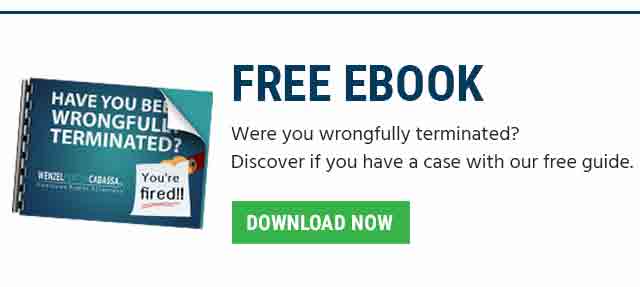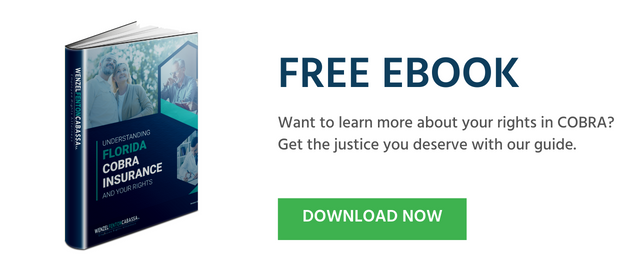You Could Get Up to $110 Per Day From Your Employment Benefit Plan

Did you lose your job? If your health insurance plan administrator neglected to give you the proper COBRA documents by the deadline specified by the Department of Labor (DOL), under federal law, ERISA, you may be able eligible to receive up to $110 for each day they failed to provide the documents.
Do the math. If you should have received a document 4 months ago, 120 days, you could potentially receive $13,200.00. Now, what if they waited 8 months to a year?
In order to collect these penalties under ERISA, you must fit in one of these three main categories:
- Did not receive copies of plan documents you requested
- Did not receive a notice of your COBRA rights
- Received a COBRA election notice missing mandatory information and/or is not written to be understood by the “average plan participant.”
Here’s a guide to help you understand what to expect from ERISA and COBRA insurance after losing your job.
What to Expect from ERISA and COBRA Insurance
The Employee Retirement Income Security Act (ERISA)

In 1974 Congress passed the Employee Retirement Income Security Act (ERISA) to protect the concerns of employee benefit (including health insurance) plan participants and their dependents. Under ERISA, plan sponsors are required to fully disclose plan features and funding. In addition, the law does the following:
- Establishes minimum standards for participation, funding, benefit accrual, and vesting.
- Gives fiduciary responsibilities to individuals who manage and control plan assets.
- Makes it compulsory for plans to set up a grievance and appeals process for participants to receive benefits from their plans.
- Grants participants the right to sue for benefits and breaches of fiduciary duty.
- When a plan is terminated, guarantees payment of certain benefits through the Pension Benefit Guaranty Corporation (PBGC).
The Consolidated Omnibus Budget Reconciliation Act (COBRA)
In 1985, an amendment was added to ERISA called the Consolidated Omnibus Budget Reconciliation Act (COBRA). This act specifically addressed employee health insurance coverage after employees were separated from employment. COBRA health insurance is essentially a safety net for employees and their families so that they can receive continued coverage under their former employer’s group health plan.
Employees can elect COBRA insurance coverage if one of the following “qualifying events” occurs:
- They quit their job.
- They were fired, unless it was due to “gross misconduct.”
- Their hours were reduced, and they don’t qualify for their employer’s health plan because they are no longer considered “full time.”
- They retire.

Under COBRA employees can continue to receive healthcare coverage for a minimum of 18 months, while their dependents (spouses and children) can receive coverage for up to 3 years. Dependents can choose Florida COBRA insurance for the following reasons:
- Their covered spouse or parent died.
- They get divorced or legally separated from their covered spouse.
- The covered employee goes on Medicare.
- The child of a covered employee turns 25 and is no longer eligible to be on his or her parent’s plan.
Under Florida law, employees have the option of changing their health insurance policy to an individual plan if they leave the group plan. If they quit their job, get divorced, or a dependent turns 25 and no longer qualifies under a parent’s group plan, the group policy can be converted to an individual policy. However, an individual policy typically costs more, and it may provide fewer benefits. That said, you don’t need a physical exam to qualify for an individual policy.
How Florida COBRA Health Insurance Works
Under U.S. Department of Labor (DOL) guidelines, employers that have 20 or more employees in their group health plan—and those individuals are on the plan for 50% or more of the working days during the prior calendar year—are required to offer COBRA insurance to their separated employees. In addition, Florida is among the states that have a mini-COBRA law, which ensures that individuals who work for employers with less than 20 employees are similarly covered after a “qualifying event.”
When is the Plan Administrator Notified?
Under COBRA, the employer must notify their healthcare plan administrator within 30 days after an employee’s “qualifying event” if the employee quit his or her job, died, or became eligible for Medicare. If the “qualifying event” is due to divorce, legal separation, or no longer having dependent status, the employer must notify the provider within 60 days. However, if the employer has between 2 and 19 employees, under the Florida Health Insurance Coverage Continuation Act, it’s the employee’s responsibility, not the employer’s, to notify the plan administrator within 30 days of separation.
When Should You Receive COBRA Election Documentation?
Once the plan administrator is notified, he or she has 14 days to send information on how to elect COBRA insurance. Under federal law, the plan administrator has the responsibility to send the COBRA election notice documents to the former employee and his or her dependents by the deadline; if they don’t they could face monetary damages of up to $110 per day for each violation from the date the notice was supposed to be sent, in addition to attorney’s fees and costs.

The former employee and his or her family then have 60 days to decide whether to continue with the coverage. It’s not necessary for the entire family to elect COBRA insurance, and it’s possible to change your mind about electing it, if it’s within the 60-day election period. In addition, it can be cancelled at any time; the former employee and/or his or her dependents are not required to carry it for the full 18 months.
If COBRA insurance is elected and the former employee notifies his or her plan administrator, the plan administrator is again legally obligated to provide copies of the plan documents within 14 days or be subject to fines or other damages. It’s the former employee’s responsibility to pay the health insurance premiums. Once the election form(s) are completed, the first premium payment is due within 45 days of the election date.
Chances are you will pay more than you did when you were an employee because you will now need to cover the part of the premium that your employer covered. For example, if you paid $200 a month and your employer paid $400 for your health insurance plan, you would have to pay $600 for COBRA insurance, along with a 2% administrative fee.
Finally, your COBRA insurance will end when the coverage period ends, you stop paying premiums, or you qualify for Medicare. It will also come to an end if your former employer goes out of business or stops offering health insurance to its employees. And if your former employer changes health insurance providers, you can switch your COBRA insurance to that provider.
ERISA and COBRA are important employee protections that safeguard employee benefits. If you feel as though your former employer has denied you these benefits or important COBRA documents were withheld from you, it’s important to speak with an experienced employee rights attorney to be fully informed about what you’re entitled to under federal law.
For more information on all of your Florida COBRA questions, contact Wenzel Fenton Cabassa, P.A.today. The initial consultation is free.
Employers Often Leave Out Mandatory Information From COBRA Election Notices
Employers sometimes issue confusing COBRA election notices to intentionally make an election of continuing coverage difficult because of the significant expense of COBRA coverage. That’s why it’s important to have an attorney help you review your COBRA election notice. For example, the COBRA election notice must include the name of the plan under which continuation coverage is available; and the name, address and telephone number of the party responsible under the plan for the administration of continuation coverage benefits. This information is often missing from COBRA election notices, leaving former employees clueless as to who to contact with questions about Florida COBRA coverage.

Additionally, the COBRA election notice must include, identification of the qualifying event, identification, by status or name, of the qualified beneficiaries who are recognized by the plan as being entitled to elect continuation coverage with respect to the qualifying event, and the date on which coverage under the plan will terminate or has terminated) unless continuation coverage is elected.
These are only a few of the many items that must be included in a COBRA election notice. If you believe your COBRA election notice is missing certain information, or if it is confusing, or if you have any questions or concerns about the election notice you received, call us today.
Contact a Florida COBRA Rights Attorney
Wenzel Fenton Cabassa, P.A., has handled thousands of workplace rights cases, just like yours, and can help you get the justice you deserve. Contact our office today to schedule your free, confidential consultation. For your convenience, we have locations in Tampa, St. Petersburg, Orlando, Jacksonville, Sarasota, West Palm Beach, and Miami.








